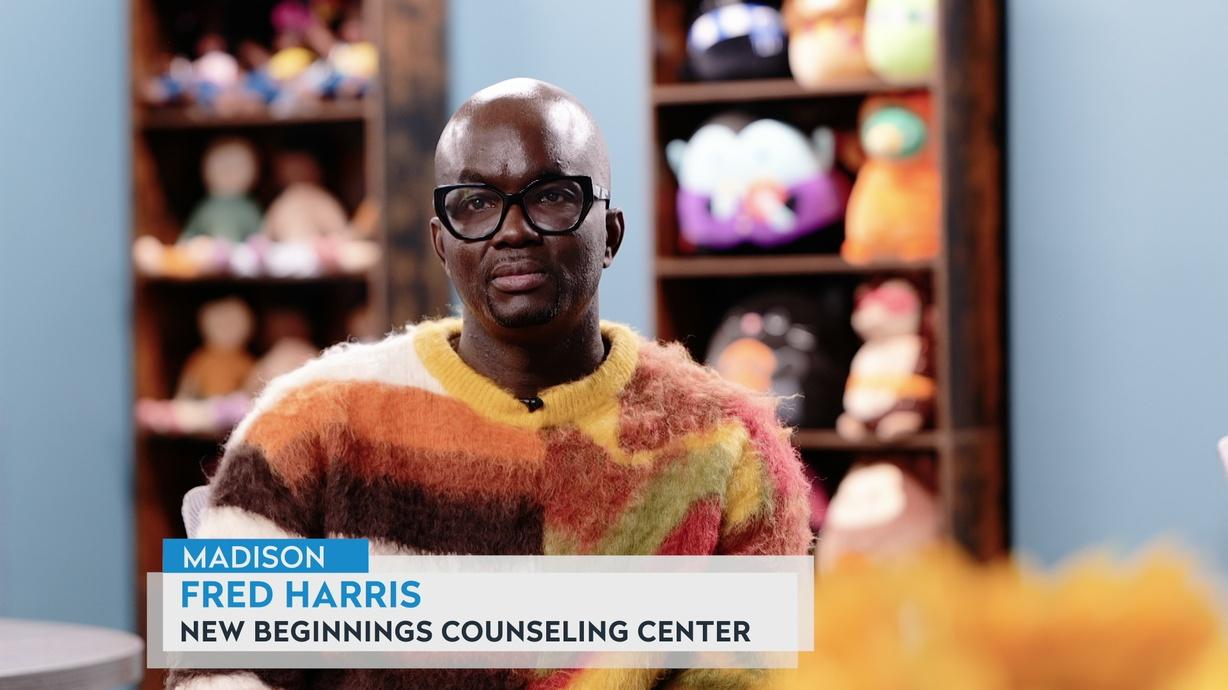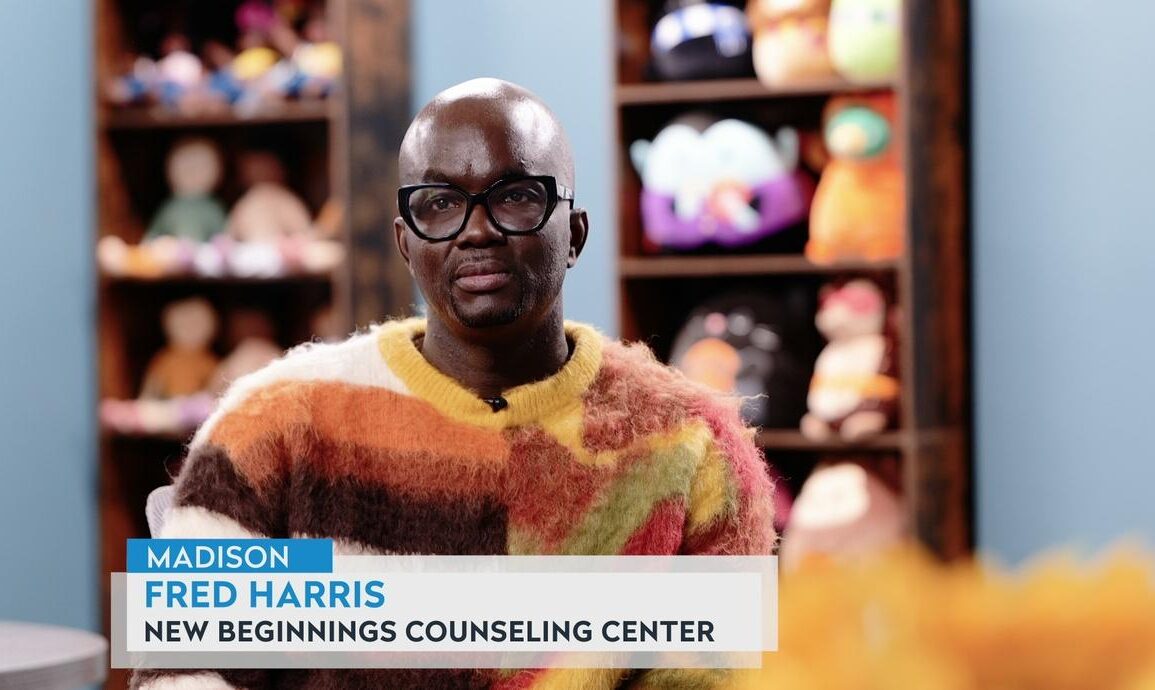
Murv Seymour:
Let’s first just maybe start with the state of things in terms of mental health treatment for Black adolescents. Are they getting help? Are there a lot of people in that group looking for help?
Fred Harris:
I think it’s growing more, especially in the political climate that we’re in and what the kids or the teenagers are enduring in schools and in not feeling safe in their environments. So yes, for Black teens and their parents be seeking out mental health services is increased definitely over the past year.
Murv Seymour:
What are you seeing in terms of the types of things you’re looking to get help with?
Fred Harris:
Anxiety, post-traumatic stress disorder, depression — all because of racism in the schools, being called the N-word by their white peers, not no support from their white teachers, not being heard. So a lot of ’em wanting to pull out of school and do virtual learning. So it’s just been really hard, and these are kids that probably never experienced anything before. Now all of a sudden they’re feeling like unsafe in an environment that’s supposed to be safe for learning.
Murv Seymour:
We talked a little bit about this when we did the article online, but when did all this start in terms of the the greater need for these kinds of kids needing help?
Fred Harris:
I would say after the, like during the pandemic after when they went back into school. So we really saw, so I, when I started the clinic, I did have a lot of parents who reached out for their kids to meet with me. But those kids were having issues that their parents were seeing in the home, and they wanted a Black provider, like single parents or parents who wanted someone that was Black or helped their kid with their identity. But after the pandemic and they went back into the schools, it has really increased.
Murv Seymour:
What was it about that do you think that led to them needing more help?
Fred Harris:
I think with the kids being at home versus like the Black teens and even the white teens, just being at home and watching what’s on television and listening to adults and not really getting educated about it, and then being sent right back into school. And it just caused this rift in between. So it, and a lot of the kids just feel like their peers that they’ve known since they were in elementary school, middle school now are calling them the N-word, now don’t want to sit next to them.
Murv Seymour:
What are you seeing in terms of the number of kids that are looking to get help?
Fred Harris:
I mean, my waitlist is, I have a six to eight-month waitlist for me in general. But I do know I make concessions even though I’m not seeing new patients. But we’re up there with, like, I think 60% to 70% of Black teens are either asking, which is rare, or either their parents are making them so they can get help.
Murv Seymour:
Are you happy with the trend in terms of the number of kids of seeking help or would you like to see more of it?
Fred Harris:
I think I’m glad that our culture — Black culture — is embracing mental health because of the stigma, but I wish it wasn’t in this way. You know, sitting across from a 14-year-old and they’re standing there in a classroom being called [bleep] or in their ears in the — they’ve never experienced anything like this before. These are things that their parents, grandparents — generally they hear about it, and it’s just so devastating that they have no support.
Murv Seymour:
We talked a little bit about kind of a unique experience that some of the Black kids are experiencing in Wisconsin, in the Madison area, because of many of them have white adoptive parents. So, what kinds of complications and things like that are these kids looking at — and the parents for that matter?
Fred Harris:
Yeah, so transracial adoption — I mean, that’s another thing that when I started here, parents was bringing them here. The parents were white, but the kids were experiencing racism and identity issues in school ’cause they don’t fit in. And by the time they become a high schooler or even middle schoolers, and I even see it as young as like elementary school, that their peers will tell ’em that they’re different. Home is safe. Parents are now feeling like they want to get them someone they can talk to that looks like them, which is good. But I think the damage sometimes is done because the stigma is they still have to — school every day, that’s where they have to go. They have to have social engagement. So, the increase for me is happening to Black kids who have Black parents, and now it’s happening. First it was like the transracial adoption — now it’s Black teens that have Black parents that raise them in a house with Black culture, so now it’s across the gamut. We have kids that are adopted by white families who are having it, and now the Black kids, teenagers who probably watched it happen in high school but it wasn’t happening to them. It was happening to the kid who had white parents. Now it’s happening to them.
Murv Seymour:
What are you telling them in terms of how they should be coping with some of these stresses?
Fred Harris:
So I do different things. Sometimes medications. So, ’cause some of them want to finish school — they actually enjoy learning, but they need to cope while they’re in school. I’ve offered learning, virtual learning — maybe your parents will pull you out and let you do virtual learning. Coping skills. Basically some of the things that I’m hearing, they typically are about their physical appearance, so assuring that, “Oh, OK you have a big nose.” “You’re ugly” — things like that. Doing a lot of work about affirming that nothing’s wrong with you. Identity, race, empowerment of who they are. So it’s just a gamut of things.
Murv Seymour:
Is there anything to a lot of the racism that they’re experiencing is coming at the hands of other people of color? Is there anything to that?
Fred Harris:
No. I think when the transracial adopted kids, when I was seeing it — yes, because they were raised by white parents in a white community. Then they go into a high school where it’s not really Black. So the Black, they don’t fit in with the Black kids, ’cause the Black kids tell ’em that. And then each social group, with the kids now, the teenagers, they just don’t — either they’re the only Black person in the classroom, Black teen. They’re, it’s like they can count how many are in the whole high school.
Murv Seymour:
Maybe just give me a little background on the DRIVE program that you got started. What is that and why did you feel a need and how’s that going?
Fred Harris:
My DRIVE is a group that is about empowering our youth, our Black youth, to not fall into society’s views of how they’re supposed to be. Allowing them to be around Black professionals in a Black space, other people like them, and also to hear from their own peers they’re not alone. Like, “It’s happening to me too,” and we provide them education around it. We even have food around it. Some of ’em have had like Black food or ethnic food in that sense. So we really try to get them this sense of encouragement that it’s not them.
Murv Seymour:
What’s the bright spot for you, Fred, in terms of what you do and why you do what you do?
Fred Harris:
Because I’m giving — all of individuals, marginalized communities, Black people, LGBTQ, BIPOC, all across — a safe space where they can process these things and also have a practitioner that they can relate to and not have this way of over explain everything, ’cause our experience can be different, but we understand. And especially with these teens. I mean, they walk in here and they’re like, “You own this place.” Most of ’em never even seen a Black person before, and they find out I’m the owner, and it’s like they’ve never even thought that. They’ve never even thought that can happen ’cause everyone around ’em successful are white.
Murv Seymour:
Last question. How can you tell that you’re making a difference and an impact on them?
Fred Harris:
Four hundred-plus patients in the clinic. They don’t leave. And teenagers, they are at the age where they can do their own autonomy, like, “I don’t want to do it,” they’ll shut down. But I’ve had some that started me as freshmen in high school and now they’re at college and they’re still in contact, and they’ve been with me all, where I have some that have been, I have some that are in elementary school right now and they want to come.
Murv Seymour:
Fred Harris, thank you for your time, sir.



